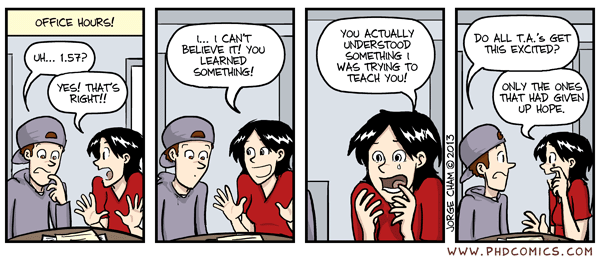I hear a lot about promoting diversity in science. Mostly, it’s about increasing the proportion of women. Sometimes it refers to people of color. Less frequently it’s about the inclusion of Latinos or people from other ethnic backgrounds. However, it’s rarely mentioned that in the sciences, people with disabilities are also underrepresented. Why is that – and what can be done to fix this? Inspired by a talk from Mahadeo Sukhai*, a blind scientist in cancer genetics, inclusivity is something I’ve been thinking about a lot over the last year. And once I started paying attention I came across a lot of insightful material: I found reports about providing more support for researchers with disabilities or about coding by voice, when typing is not an option. I stumbled on an  interesting articles about how to make physics courses more accessible for blind students or welcoming deaf students into STEM. And chemist Mona Minkara has an awesome website with tools and resources for blind scientists or anyone teaching a blind scientist. But by far the most comprehensive guide I’ve read is Creating a Culture of Accessibility in the Sciences. As a 300-page book, it has been an interesting but tough read, providing lots of context and fundamental considerations, but it was also quite a slog to work my way though. So, for anyone interested in this book, here my highlights and disappointments!
interesting articles about how to make physics courses more accessible for blind students or welcoming deaf students into STEM. And chemist Mona Minkara has an awesome website with tools and resources for blind scientists or anyone teaching a blind scientist. But by far the most comprehensive guide I’ve read is Creating a Culture of Accessibility in the Sciences. As a 300-page book, it has been an interesting but tough read, providing lots of context and fundamental considerations, but it was also quite a slog to work my way though. So, for anyone interested in this book, here my highlights and disappointments!
Category Archives: Public policies
Marching on the capital
– a personal take on the French #SciencesEnMarche movement

Amélie and the garden gnome
Before I moved to Lyon, my view of France was based primarily on popular media. Looking back at my expectations, I can now report a disappointing lack of obsession with garden gnomes, whereas the myth of exorbitant amounts of dog poo on French streets has proven true. I can’t comment on the quantity and quality of late night porn on national television (supposedly a lot and explicit) since I don’t own a TV. As for endless strikes and protests, after a lackluster year with no major demonstrations, finally something big is happening! Researchers in France are – as someone said on twitter – “doing what the French do best: protesting”. In a movement called Sciences En Marche, scientists from all over the country are cycling, hiking and kayaking towards Paris, protesting against the government’s neglect of science. Reports of the demonstration and the demands have been reported elsewhere (amongst others a detailed write-up in the LabTimes, and also in Science and Nature). So today, having seen Sciences En Marche in action, as the “protests” arrived in Lyon, I’ll share my personal view of things.

Sciences En Marche in Lyon. The flag of the movement is attached to a Vélo’v bike, an iconic symbol of the city, as local scientists join the demonstrators on their way to the city center.
And so they fail again? The EC’s Science 2.0 consultation
The European Commission (EC) has a complicated relationship with media campaigns. Two years ago, its #sciencegirlthing campaign and the accompanying ridiculous video earned it some pretty heavy criticism.
While it was generally agreed that intentions were good, when considering the practical realisation, the phrase a miss is as good as a mile sprung to mind (see here, here and here). After such an epic failure, you’d think the EC learnt its lesson when it comes to media campaigns. Alas, it is not so. Last week, they launched a public consultation on “Science 2.0” (#science20). Initially, I was thrilled: finally, decision makers wanted to hear my opinion on the topic. However, as I went through their website my heart sank: once again, they’ve got it all wrong, bunching together different aspects of Science 2.0, not differentiating sufficiently between different groups of respondents, and generally not quite getting the point why researchers are using online tools. Continue reading
Woman, know thy place!
Generally, I try not get (too) involved in the whole gender bias, glass ceiling, women having to chose between family and career, etc debate, mainly because I think it’s too complex an issue to briefly discuss in a blog post. But a new Hungarian ad for a fair for women has made my blood boil, and calls for commentary. Continue reading
Is more really better?
As long as I can remember, I’ve heard teachers, professors and politicians say that we should encourage more high-school and university students to pursue a career in science. And I used to be a believer. After all, the people who said this, were the ones at the top, the ones with a proper oversight of things. However, today, I’m not so sure anymore. In fact, I’m becoming more and more convinced that encouraging people to pursue a career in science (or at least research) may just be a way for universities to generate competition and thus obtain a source of cheap labor.
 Sounds like a conspiracy theory? Maybe. But here’s why:
Sounds like a conspiracy theory? Maybe. But here’s why:
As I grow older, more and more of my friends, who used to work in research (and who really liked doing so) drop out. They move towards alternative careers, such as science communication, industry, teaching etc. And they generally list the same reasons for doing so:
1. Early-career researchers get little reward for their work: this primarily means that they consider themselves being underpaid and overworked. Money matters.
2. There’s too much insecurity, pressure and competition as you move up the ranks: there are many, many good scientists with great publication records, who’d all like to have a junior group leader or tenure track position. Obviously, the more people you feed into the system at the lower ranks, the more will compete for the jobs at the top. But there are increasingly less long-term contracts handed out . Security matters. Moreover…
3. … science is becoming less of a vocation and more like a job: It seems to be less crucial nowadays how good or creative you are, and increasingly important how well you can manage and advertise yourself. Your ideas and hands-on experience seem to matter less than what your CV looks like, in what labs you’ve worked and how well you’ve published. And since the results of your first five to ten years of research may therefore define your later career options, this discourages “outiside-the-box-thinking” and taking on risky projects. Often this also means, that science-related non-research activities are undervalued: I’ve filled in fellowship applications where there is no option to include teaching or the organization of science events as an asset.This is extremely frustrating, if you consider that much of science knowledge is actually passed through the grapevine: by great teachers and lecturers who transmit their love of science as well as up-to-date knowledge, and by experienced lab staff who show you the do’s and do not’s of experimental design and lab techniques.

Motivated teachers matter!
from “Piled Higher and Deeper” by Jorge Cham http://www.phdcomics.com
So, all in all, my interpretation of the data: thanks to increasing numbers of PhD students and postdocs, there’s plenty of “raw material” to chose from. Therefore PIs and legislators can get away with providing low job security, as well as relatively low salaries. Also, having more early-career researchers also requires less personal touch and more standardized metrics. And keeping it this way means a cheap workforce, which is why people at the top encourage more students to pursue a career in research. And thus the vicious circle continues…
Still think it’s a conspiracy theory? Maybe. Maybe also have a look at Paula Stephan’s book, How Economics Shapes Science. It provides a much broader and nuanced overview of the interplay between economics and science, including a detailed analysis of supply and demand in research.
But please keep this rant in mind, next time someone tells you we need to recruit more students into science!
The guinea pigs that weren’t
You may have heard: Michael Bloomberg, the mayor of New York City, is worried about the health of his citizens. More specifically, he’s worried about obesity. So, a couple of months ago, in a rather drastic measure, he decided to introduce the NYC soda ban: to limit the sale of certain sugary soda drinks larger than 16 ounces (approx 0.5 l) in certain businesses overseen by the Department of Health and Mental Hygiene. However, back in March, one day before it was supposed to take effect, the ban was ruled unconstitutional by a State Supreme Court. Yesterday, the state’s Appeals Court decided that this previous ruling should be upheld.
Shame.
Not that I am personally particularly worried about the caloric consumption or the health of NY citizens. No. I was, however, looking forward to one of the largest health experiments ever, with all those people roped in as unwilling experimental guinea pigs.
For one, it would have been a great behavioural experiment: would people have maintained the same volume of soda consumption, drinking a larger quantity of smaller volumes?
But more importantly – assuming that people would have reduced their soda consumption – would it really have made a difference? I mean, soda often comes up as a “culprit” in association studies between obesity and environmental factors, but these are mainly associations. And generally, the population with the highest soda consumption is also the one with highest consumption of unhealthy, high-calory food, partaking in less physical activities etc. So, there has been much to-and-fro about true causation and a possible fix. Therefore, I would have been extremely curious about the outcome of such a large-scale, long-term experiment, where this single variable is modified. I mean, clearly, it wouldn’t have been a perfect experiment (where’s the control group?), but from a scientific point of view, it could have been an interesting one…

